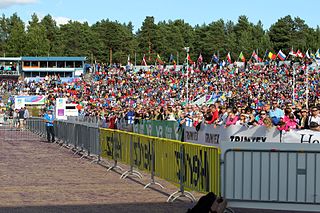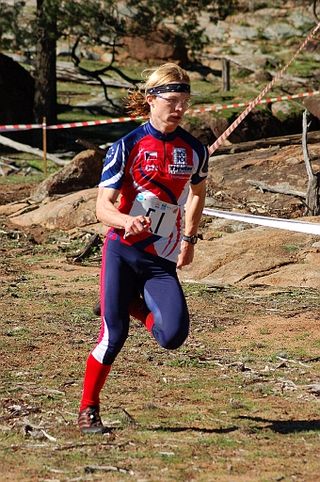
Orienteering is a group of sports that involve using a map and compass to navigate from point to point in diverse and usually unfamiliar terrain whilst moving at speed. Participants are given a topographical map, usually a specially prepared orienteering map, which they use to find control points. Originally a training exercise in land navigation for military officers, orienteering has developed many variations. Among these, the oldest and the most popular is foot orienteering. For the purposes of this article, foot orienteering serves as a point of departure for discussion of all other variations, but almost any sport that involves racing against a clock and requires navigation with a map is a type of orienteering.

The World Orienteering Championships is an international orienteering competition which has been organized by the International Orienteering Federation (IOF) since 1966. The World Orienteering Championships is considered to be the most prestigious competition in competitive orienteering. The races are contested between members of the IOF, which are each aligned to a National Olympic Committee.

Hanne Staff is a Norwegian orienteering competitor who has won three individual World Orienteering Championships gold medals.

Åge Hadler is a Norwegian orienteering competitor, winner of the 1966 and 1972 individual World Orienteering Championships, relay champion from 1970, and individual bronze medalist from 1968.

Pasi Ikonen was a Finnish orienteering competitor, winner of the middle distance at the 2001 World Orienteering Championships. His other achievements include two individual silver medals at the world championships, and medals at the World Games and the European championships.
Janne Juhani Salmi is a Finnish orienteering competitor and world champion. He won the short distance at the 1997 World Orienteering Championships, and a gold medal in the relay at the 2001 World Orienteering Championships. He won a total of three individual world championship medals and four relay medals, and won the Jukola relay three times with the club Turun Suunnistajat.

Daniel Hubmann is a Swiss orienteering competitor. Hubmann is the most successful male Swiss orienteer of all time, with 9 Gold medals at the World Orienteering Championships. In 2023, with his victory in the relay at the 2023 World Orienteering Championships, Hubmann became the oldest competitor to win a gold medal at the World Orienteering Championships, at the age of 40 years and 61 days. Hubmann is currently the third most successful male orienteer of all time, behind Thierry Gueorgiou and Olav Lundanes, and has won more medals in total than any other male orienteer.
Sinikka Kukkonen was a Finnish orienteering competitor. She is World Champion in both orienteering and ski orienteering. She became the first World Champion in ski orienteering, in 1975.
Marika Mikkola is a Finnish orienteering competitor and World champion. She won a gold medal at the 2001 World Orienteering Championships in Tampere and a silver medal in Västerås 2004 with the Finnish relay team. She also received an individual silver medal in 2001 and bronze medal in 2004 in the long distance event. Marika's clubs have been Reima-34, Espoon Suunta, Angelniemen Ankkuri, Bækkelagets SK, Espoon Suunta and Kalevan Rasti.
Johanna Asklöf is a Finnish orienteering competitor and World champion.

Magne Dæhli is a Norwegian orienteering competitor, ski-orienteer, and cross-country skier. His achievements include five medals in the relay at the World Orienteering Championships, of which three are gold medals. His best individual performances include a silver medal in the long distance from the European Orienteering Championships, and a bronze medal in the middle distance from the 2019 World Orienteering Championships.

Štěpán Kodeda was a Czech orienteering competitor, and twice junior world champion.

Søren Bobach is a Danish orienteering competitor, and world champion at both junior and senior level. He runs for OK Pan Århus.

Martin Johansson is a Swedish orienteering, ski-orienteering, and cross-country skiing competitor, a medallist at the orienteering world championships, and a 2004 Junior World Champion in relay. He received bronze medals in sprint at the World Orienteering Championships in Kyiv 2007 and Olomouc 2008. His brother, Lars, is a member of the Rockford Icehogs

Tomáš Dlabaja is a Czech orienteering competitor.
Veijo Tahvanainen is a Finnish orienteering competitor. He received a silver medal in the relay event and finished 10th in the individual event at the 1968 World Orienteering Championships in Linköping. In 1970 he finished 14th in the individual event, and 4th with the Finnish relay team. At the 1972 World Orienteering Championships in Staré Splavy, he placed 9th in the individual contest, and was part of the Swiss relay team. He won the Jukola relay in 1967 and 1968.
Markku Salminen was a Finnish orienteering competitor. He received a silver medal in the relay event and finished 13th in the individual event at the 1968 World Orienteering Championships in Linköping. In 1970 he finished 4th with the Finnish relay team. In 1974 he finished 16th in the individual event, and received a silver medal in the relay with the Finnish team. In 1976 he finished 5th in the individual event, and received a bronze in the relay. Salminen won the 1970 and 1978 Jukola relay.

Adrian Jackson is an Australian mountain bike orienteering competitor and World Champion. He has won individual gold medals at the 2004, 2008, 2009 and 2010 World MTB Orienteering Championships.

Troy de Haas is an Australian tower running, mountain running and orienteering competitor.

Matthias Kyburz is a Swiss competitor in orienteering and athletics. In orienteering, Kyburz has attained gold medals in the Junior World Orienteering Championships, European Orienteering Championships and the World Orienteering Championships. In athletics, Kyburz is a long-distance specialist; Kyburz attained the world record in 50 km on a treadmill of 2:56:35 on 16 April 2020, breaking a record held by Florian Neuschwander. On 7 April 2024 Kyburz ran 2:07:44 in his Marathon debut, becoming the third fastest Swiss athlete of all time over the distance after Tadesse Abraham and his coach Viktor Röthlin, and achieving the qualifying standard for the 2024 Olympic Games. In the Olympic Marathon, Kyburz finished in 30th place.













